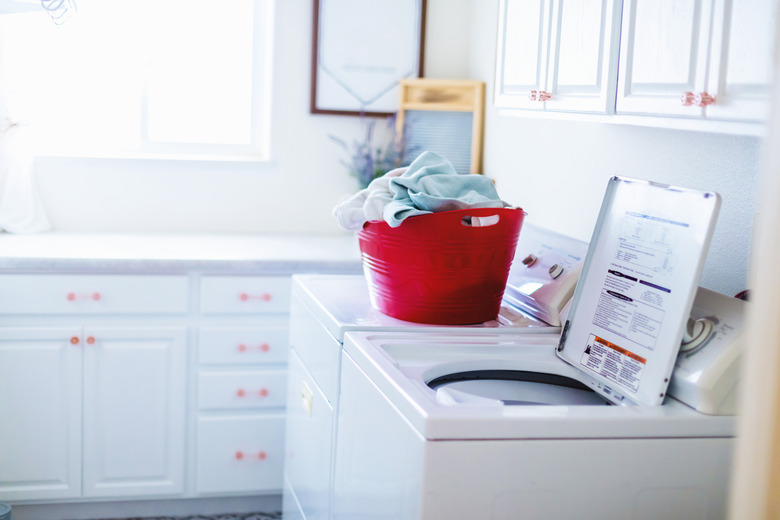My GE Washer Has A Noisy Spin Cycle
We may receive a commission on purchases made from links.
There's nothing quite so jarring as being interrupted by a wildly loud spin cycle when the laundry's gone awry. Usually, the suddenly loud spin cycle on your GE washer isn't a problem; it's just that the machine's balance has been compromised, and the tub is now making a ruckus. However, if balance is attained but the machine still remains angry loud, there are other factors to consider.
Solving Balance Issues
Solving Balance Issues
Washing tubs spin freely, smoothly, and rapidly thanks to the wonders of engineering and precision balance. There are usually two key ways you can send a machine into a tizzy through imbalance, resulting in thumping and banging noises. The most common occurs when people cram their clothing into the tub without considering weight displacement. For instance, if there are all jeans on one side of a washer and a bunch of cotton bed sheets on the other side, the heavy jeans will make the tub lopsided, and it will spin incorrectly.
The easy solution is to just open the lid, wait for the machine to stop spinning, and then move items around until they are better distributed. Close the lid and it should resume spinning correctly right away. If the clothing was redistributed and it's still loud and you've only just set up the machine recently, it may be that the feet are incorrectly set.
The washer's feet are on screw posts that allow you to raise or lower each corner of the machine individually to account for the unevenness of some flooring. Have a friend spot a level on top of the machine while you raise or lower each corner. Let them instruct you on whether to raise or lower each corner. Once the machine is level from front to back and side to side, it should alleviate any banging spin cycles. If not, it will probably require repairs.
Be aware that front-loading machines may experience different balancing issues and have their own troubleshooting methods.
Defective Ball Bearings
Defective Ball Bearings
Ball bearings look so innocuous, but the minute one chips or gets a defect in any way, it can be a squealing, grinding hell as the washer stops spinning in its characteristic smooth, unrestricted manner. There's some disassembly involved in repairing it, so it's best for a repair technician to handle it, and it shouldn't be expensive.
To avoid a future ball bearing episode, don't overload your washer. You'll get the best performance and life from the machine if you keep it to 3/4 loads or less.
Other Parts That Can Fail
Other Parts That Can Fail
There's a pulley at the back of the machine that keeps the drive belt spinning, which then turns the tub. When it starts to go, the belt doesn't spin correctly, and the tub follows suit. Depending on your model, replacing the drive pulley may be a repair you can make yourself.
Elsewhere, regulating the speed of the machine is part of the clutch assembly's job. When it eventually wears out, the improper speed regulation can mean all sorts of things happen, so there's no clear sign of when it's the clutch assembly calling it a day. This is usually a job for a repair person.
A job that's always meant for a repair person is the more complex task of replacing the drive motor coupling. The coupling is actually designed to fail when you grossly overload a machine. If it's crammed too full, it can break the transmission and the drive motor, so this is somewhat of a fail-safe. Usually, if you remove several articles and rebalance the machine, it will resume washing properly, but if it failed because it truly was too full and the coupling broke somehow, then you'll need to have it replaced by a repair professional.
The Takeaway: Don’t Overload
The Takeaway: Don't Overload
The worst thing you can do to your washer is to keep cramming it full of laundry. You think you're saving yourself time, but you're also dramatically reducing the life of your appliance. There's only so much weight the inner workings can handle. Your laundry will also be cleaner if you slightly reduce your load size.
